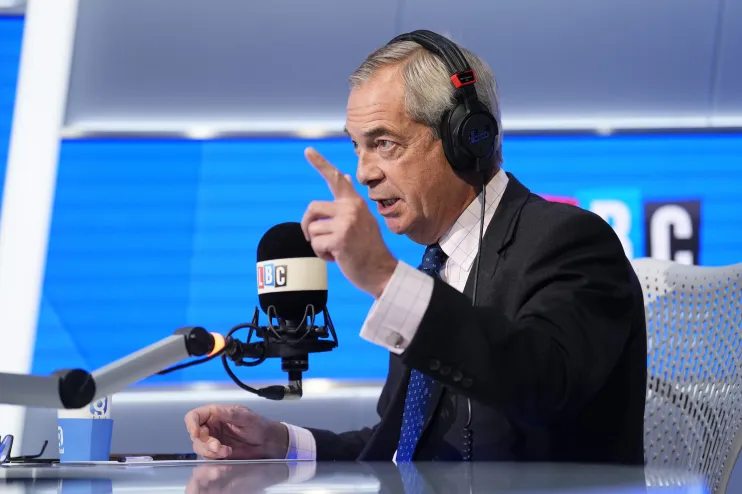By Mauricio Alencar
Copyright cityam

Nigel Farage has appeared to row back on key aspects of his legal migration pledges amid mounting questions over whether his figures stand up as well as fierce criticism from top lawyers and researchers on the viability of his plan to end Indefinite Leave to Remain.
The Reform UK leader told LBC on Wednesday morning that benefit bans for migrants would not apply to Ukrainians and Hong Kongers – just days after saying refugees from those countries would have to follow the same rules as other migrants.
In a morning Q&A with listeners, Farage said a special exemption would be made for Ukrainians and Hong Kongers under plans to stop benefits being offered to migrants
“They come for different reasons,” he said.
“When it comes to genuine refugees, if you study the record, they do not tend to live off social security. They tend actually to have been some of the hardest working and most successful people in the country.”
Farage added that people from Afghanistan, who also arrived on specialised visas offered to refugees and people who worked with UK forces, were a “slightly different category” and “depends who they are”.
On Monday, Reform UK pledged to cut welfare spending and curb legal migration by abolishing indefinite leave to remain rights, which grant settled status, if it were elected.
In response to a question from a report on whether ILR would be revoked for Ukrainians and Hong Kongers, Farage said: “800,000 people are due to qualify for ILR over the course of the next few years. This press conference is to say none of them will get it.”
The proposals scrap ILR entirely to remove eligibility for migrants to receive benefits, including for people who currently have settled status.
Nigel Farage’s citizenship claims tested
The Reform UK leader also claimed that policy proposals unveiled in a wide-ranging paper on Monday did not suggest families would be broken up and that dual citizenship would not be banned.
But proposals set out this week state migrants would have to “renounce other citizenships” in order to gain British citizenship after having been in the UK for seven years.
The current qualifying period is five years though Labour is planning to double the period for both settlement and citizenship to at least ten years. Dual citizenship is allowed.
Farage has also faced serious questions over the figures he offered around savings to be made and terms of details around EU citizens settled in the UK.
Reform officials said the UK could save £234bn from migrant benefit cuts though the figure appeared to be taken from a report published by the Centre for Policy Studies, which later said the data in the report was the “subject of dispute” and estimates had been updated since it released its findings.
Farage has stuck by the figure and said it could be “considerably bigger”.
Businesses and lawyers hit out at Reform UK
Doubts around the numbers of people which would be affected by the changes also emerged as Farage said it would only apply to non-EU migrants on ILR, which only make up 2.7 per cent of universal credit claimants.
Farage claimed he would negotiate a deal with the EU to prevent its citizens with settled status in the UK from claiming benefits, potentially re-opening a thorny issue in Boris Johnson’s Brexit deal struck in 2021.
Leading business groups including the Institute of Directors and the British Chambers of Commerce have raised eyebrows at plans set out by Reform and claimed it might worsen labour shortages across the UK.
Lawyers at Vanessa Ganguin Immigration Law have said that the proposals were “designed to stoke fear” while reforms represented “muddled thinking”. Other lawyers including Sherrads’ Nelli Shevchenko have said Reform risks driving “social engineering by expulsion” while proposals would fall apart after judicial reviews.



